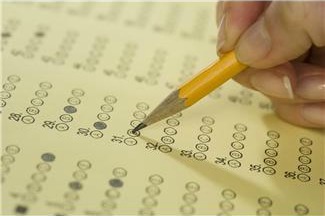
Are digital resources more effective than textbooks? They are certainly more trendy these days. Although Learning List has reviewed hundreds of instructional materials in both formats, it’s difficult for us to say that one format is better than another. Online adaptive products that individualize learning for each student have the potential to differentiate instruction and keep all students challenged, while textbooks are easier to use, particularly for students without Internet access at home. As more digital content providers are entering the K-12 marketplace, we are paying close attention to research and policy discussions about the effectiveness of online products. We thought our readers might be interested in a recent Bloomberg View that summarizes findings from a 2015 Organization for Economic Cooperation and Development (OECD) report.
 The report’s key finding is that “increased computer use in classrooms leads to lower test scores.” The OECD compared test results from the 2009 and 2012 Program for International Student Assessment (PISA) for groups of students who did and did not use digital resources for instruction. Results indicated that “the use of computers was negatively correlated with improvements in student performance” in both math and reading. That is, students who did not use digital resources performed better on the PISA tests, though there were some anomalies.
The report’s key finding is that “increased computer use in classrooms leads to lower test scores.” The OECD compared test results from the 2009 and 2012 Program for International Student Assessment (PISA) for groups of students who did and did not use digital resources for instruction. Results indicated that “the use of computers was negatively correlated with improvements in student performance” in both math and reading. That is, students who did not use digital resources performed better on the PISA tests, though there were some anomalies.
In addition, students in Japan, China, South Korea and other Asian economies where fewer students use computers, also did better on computer-based assignments. These students were no less comfortable using technology than students in Australia and Northern Europe where computers are more prevalent in instruction.
The reason? The report concludes:
Gaps in the digital skills of both teachers and students, difficulties in locating high-quality digital learning resources from among a plethora of poor-quality ones, a lack of clarity on the learning goals and insufficient pedagogical preparation for blending technology meaningfully into lessons and curricula create a wedge between expectations and reality. If these challenges are not addressed as part of the technology plans of schools and education ministries, technology may do more harm than good to the teacher-student interactions that underpin deep conceptual understanding and higher-order thinking.
Learning List’s Alignment Reports, Editorial Reviews and new Spec Sheets help educators overcome two of the challenges identified in the OECD report: finding high quality digital resources and blending digital resources into lessons and curricula effectively.
 The new Spec Sheets are Learning List’s two-page checklist of each product’s key academic and technology attributes. The Spec Sheets complement our more comprehensive Alignment Reports and Editorial Reviews to help educators quickly identify high-quality digital products that meet their students’ needs and can be implemented successfully using the district’s current technology. We hope that this at-a-glance review will help districts’ curriculum and technology teams quickly narrow the list of products to review themselves.
The new Spec Sheets are Learning List’s two-page checklist of each product’s key academic and technology attributes. The Spec Sheets complement our more comprehensive Alignment Reports and Editorial Reviews to help educators quickly identify high-quality digital products that meet their students’ needs and can be implemented successfully using the district’s current technology. We hope that this at-a-glance review will help districts’ curriculum and technology teams quickly narrow the list of products to review themselves.
Learning List’s Alignment Reports also help educators integrate digital instructional materials into their lesson plans/curricula for more effective instruction. These detailed reports identify multiple citations (i.e. page numbers, lesson names) that Learning List’s subject matter experts determined to be aligned to the content, context and cognitive demand of each standard. Only by assigning the parts of the material that are aligned to each standard can teachers have confidence that their students are learning the knowledge and skills the standards require.
Stop by our booth (#1817) at the TASA/TASB Convention this weekend, and let us show you how our service and our new Spec Sheets can help your district choose and use instructional materials more effectively. If you won’t be at the conference, request a webinar at your convenience, and we’ll be glad to introduce you to our service.